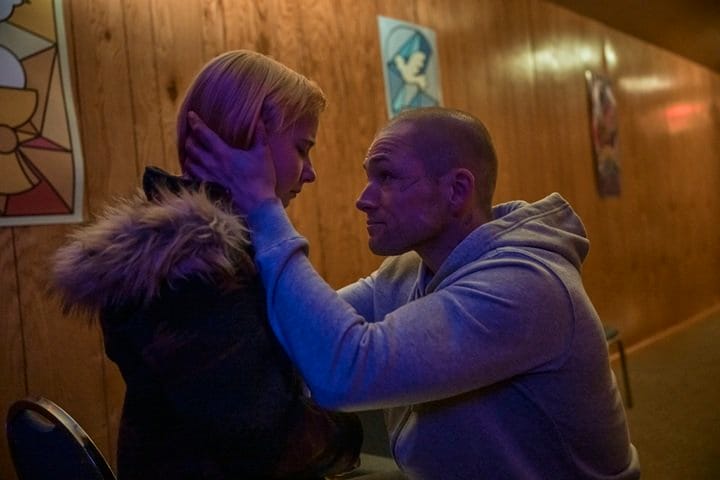She Rides Shotgun isn’t your typical action thriller, and thank god for that. It’s not flashy or overstuffed with gunfire just for the sake of spectacle. Instead, it’s grounded — raw, even — and it hits with a quiet emotional intensity that sneaks up on you. At its core, this is a story about survival, not just from physical danger but from emotional trauma. And what makes it unforgettable is how it unfolds through the eyes of an 11-year-old girl, Polly, played with an almost haunting subtlety by newcomer Ana Sophia Heger. Her performance doesn’t shout. It doesn’t need to. It lingers — and it hurts in the best, most honest way.
The film follows Nate (Taron Egerton), a recently released convict whose new “freedom” is tainted with deadly strings attached. He owes people. Dangerous people. And because of that, he’s forced to take his estranged daughter Polly and go on the run. What begins as what looks like a kidnapping turns into something far more complicated, layered, and emotionally fraught. This isn’t a redemption arc wrapped up in sentimentality. It’s messy, violent, and deeply uncomfortable at times — just like real-life trauma often is.
There’s something so refreshing about the way She Rides Shotgun handles the relationship between father and daughter. It’s not softened for comfort. Nate is hard to root for in the beginning. He’s impulsive, tattooed, and violent — hardly the image of a stable parent. And Polly? She’s scared, quiet, and clearly not used to being protected. But as the story unfolds, their bond becomes the emotional thread that holds everything together. It’s tender and fierce, and not once does it try to manipulate the audience with overdone emotional cues. It just is — lived-in, real, and quietly devastating.
What I loved most about Polly’s arc is how much strength she carries in her silence. She isn’t a precocious, overly scripted “kid character.” She’s observant, cautious, and absorbing everything. Heger delivers a performance far beyond her years — not by being loud or overly dramatic, but by saying everything with just her eyes. There’s a moment where she watches her father make a life-or-death decision, and the way she processes it without a word is more powerful than any monologue could be.
The film’s pacing is deliberate. Some might call it slow, but I’d argue it’s focused. It takes its time letting us sit with these characters. It wants us to feel the tension in the silences, the exhaustion in their movements, the fear in every pause between hiding and fleeing. And when the violence does come, it’s jarring and messy — not stylized, but brutal in a way that reminds you just how real the stakes are. There’s one major action sequence near the end that feels slightly chaotic in its editing, but honestly, it mirrors the panic of the characters so well that I didn’t mind it.
The film also doesn’t make the villains flashy. In fact, for the first half, we barely see them. They exist in the periphery — a looming, invisible threat. Some might say this weakens the tension, but to me, it mirrors how trauma often works. The danger isn’t always seen; it’s felt. And that invisible dread? It weighs heavy, especially on Polly, whose young mind is trying to make sense of a world that’s constantly failing her.
What grounds this movie even more is how it refuses to glorify Nate’s choices. There are no easy heroes here. Egerton plays Nate with so much internal conflict that you’re never quite sure if you should trust him — and that’s the point. This is a man at war with himself, desperately trying to protect someone he barely knows how to love, and Egerton captures that with raw vulnerability. It's his best work to date — stripped down, exhausted, and human.
She Rides Shotgun is gritty, yes. But it’s also poetic in its own dark, understated way. It’s a film about broken people trying to survive in a broken world. About the sharp, complicated love between a father and daughter. And about the quiet resilience of a young girl who learns, far too early, how to carry herself through chaos.
By the end, I wasn’t thinking about plot twists or action sequences. I was thinking about Polly — about what she saw, what she felt, what she had to grow through. And that’s the film’s real achievement. It’s not just a thriller. It’s a portrait of survival, painted in pain and silence, and carried by a girl who says more with one look than some actors do in entire scripts.
And honestly? That’s what makes it unforgettable.
Director: Nick Rowland
Cast: Ana Sophia Heger, Taron Egerton, Odessa A'zion
Writers: Ben Collins, Jordan Harper, Luke Piotrowski, Nick Rowland
Producers: Collin Creighton, Nate Matteson, Hiro Murai, Brad Weston
Composer: Blanck Mass
Cinematographer: Wyatt Garfield
Editor: Julie Monroe
Screening or Streaming Availability:

